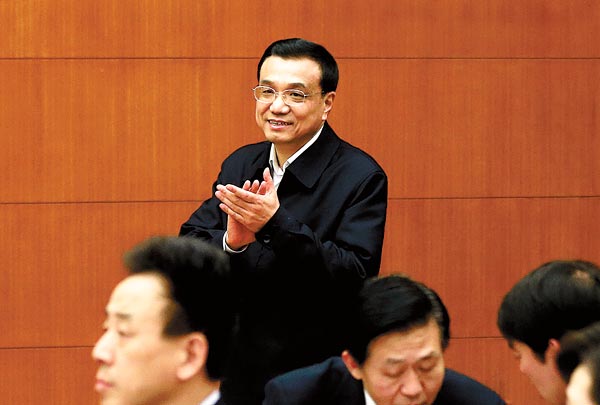Li builds case for urbanization
Updated: 2012-12-21 01:16
By Chen Jia (China Daily)
|
||||||||

Economic growth must focus on quality and efficiency: vice-premier
Urbanization will be the main driver of economic growth for the future, Vice-Premier Li Keqiang said on Wednesday.
Growth will be more focused, with the onus on quality and efficiency, not just speed, Li said.
"Economic growth must be real," he said at a meeting discussing reform.
Growth will have to ensure more job opportunities, higher incomes, better performances by enterprises and more effective use of energy and resources, he said.
Domestic demand, especially from unprecedented urbanization, will overtake exports to become the main driver of the economy, Li said.
The vice-premier also said it is an urgent task to reform investment and fundraising systems to boost domestic consumption.
He urged officials to clear the hurdles for the reform.
Large-scale urbanization and related development projects are likely to drive GDP growth to 8.4 percent in 2013, the World Bank said on Wednesday.
The global organization predicted that due to weak exports and the government's efforts to cool the real estate sector, GDP will grow about 7.9 percent in 2012, the slowest pace since 1999.
The annual session of the National People's Congress, the top legislature, scheduled for March, will set economic targets while deciding the line-up of the new cabinet.
Many economists forecast that the government would set the GDP target at around 7.5 percent for 2013, the same as 2012. A higher target might give the impression that growth, rather than its quality, was the priority, they said.
Setting a lower target also reflects government confidence in pushing for reforms while maintaining still-robust growth, said Xu Hongcai, economist with the China Center for International Economic Exchanges, a government think tank.
Other analysts from financial institutions, including JPMorgan, Bank of China and Nomura Securities, also forecast growth above 7.5 percent next year.
In the meantime, "larger investment, both private and public, will be welcomed by the government in the development of urban infrastructure and the social security system", Xu said. "Improvements in the financial system will also help cut down the downside risks in 2013."
The government will offer tax cuts and help small enterprises and companies in the service sector, according to Xu.
Xu said he is also looking forward to massive investment in urban rail systems, telecom and subsidized housing projects for low-income households.
But the investment blitz should be tempered to avoid excessive production, as inflation may rebound in the coming months, he added.
Some economists predict that the 2013 consumer price index, a main gauge of inflation, will be around 3.5 percent.
Xu said he will not rule out the possibility of a 4 percent inflation rate.
"The CPI may rise faster in the second half of next year," he warned, saying an easy credit supply from the US Federal Reserve will probably drive up global commodity prices and cause capital inflow into emerging-market countries.
A recent report from the Fitch ratings agency said it is inevitable that more reform measures will be launched in China in 2013 to facilitate the economic "rebalancing".
Contact the writer at chenjia1@chinadaily.com.cn

 Relief reaches isolated village
Relief reaches isolated village
 Rainfall poses new threats to quake-hit region
Rainfall poses new threats to quake-hit region
 Funerals begin for Boston bombing victims
Funerals begin for Boston bombing victims
 Quake takeaway from China's Air Force
Quake takeaway from China's Air Force
 Obama celebrates young inventors at science fair
Obama celebrates young inventors at science fair
 Earth Day marked around the world
Earth Day marked around the world
 Volunteer team helping students find sense of normalcy
Volunteer team helping students find sense of normalcy
 Ethnic groups quick to join rescue efforts
Ethnic groups quick to join rescue efforts
Most Viewed
Editor's Picks

|

|

|

|

|

|
Today's Top News
Health new priority for quake zone
Xi meets US top military officer
Japan's boats driven out of Diaoyu
China mulls online shopping legislation
Bird flu death toll rises to 22
Putin appoints new ambassador to China
Japanese ships blocked from Diaoyu Islands
Inspired by Guan, more Chinese pick up golf
US Weekly

|

|






